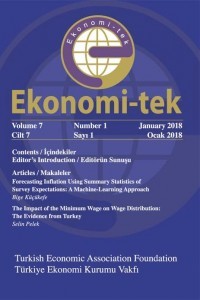
Ekonomi TEK
Yazarlar: Ünay TAMGAÇ TEZCAN
Konular:İktisat
Anahtar Kelimeler:Household expenditures,Reference group,Peer effects,Developing country,Turkey
Özet: It is well-known that relative concern influences many economic choices, including consumption decisions. Recently, several studies have linked the gradually falling savings rate in the United States since the 1980s with both relative concern and increased inequality. In this paper, we test for the presence of relative concern (i.e., peer effects) in consumption decisions for Turkey. In particular, we test whether households are affected by the purchases of other households who constitute their reference group. This is one of the few studies that investigate relative concern in a developing-country setting. Drawing on nationally representative data from the Turkish Household Budget Survey for the years 2003-2012, we examine different reference groups comprised of members having the same education level, urban-rural residence status, or age range. We find that the hypothesis is validated and that non-rich households are affected by perceiving the consumption of more prosperous individuals of the same educational background. However, we do not observe any group effects for upper-income households.